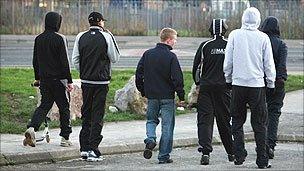Scotland's councils face up to tough choices
- Published

Unions say thousands of jobs have already been lost in local government
It's been a year of stories about council cuts... And to quote the late Ronald Reagan - you ain't seen nothing yet.
Not that either the Scottish Government - or Scotland's 32 councils would say they want to be in this position of course.
Driving up value is one thing - which may sometimes, perhaps, be overdue. But cuts to services that people want are quite another.
As trade union Unison warns... 12,500 jobs have gone in local government in the past year and more cuts are expected. Many fear that efficiency savings cannot go much further and that even more of the cuts will be felt directly by the public.
It should be noted though that there have only been a handful of what would officially be classed as compulsory redundancies. The vast bulk of the jobs have gone through voluntary redundancies, early retirements and decisions to leave vacancies unfilled. Having said that, some former workers who were offered redeployment to jobs they did not want regard themselves as effectively having been made compulsorily redundant.
As ever - it's a chain stretching from Downing Street to your own street.
The Scottish Government gets its cash from Westminster and expects its budget to shrink by £3.3bn in the next three years.
Councils typically get about 80 pence of every pound they spend from the Scottish Government. And it's got to decide how to divvy up the cash between councils and everyone else.
We know the government's committed to freezing the council tax for the next five years.
There's no deal yet to do this. But we can assume how it'll be achieved.
Pooling resources
In previous years the governments offered a carrot and stick. Basically - they've told councils they'll get a poorer deal from Holyrood if they put up the council tax.
Even critics - like Labour-run Glasgow which protested last year after Finance Secretary John Swinney's budget that there was no deal on the council tax - still ultimately accepted the government's offer, however unhappy they may have been with it
With years of cuts likely, councils have broadly looking at two distinct ways of trying to safeguard what they believe matters most.
One is pooling resources or sharing services - either between neighbouring councils or different public sector agencies.

Councils want to address problems of youth behaviour early in a child's life
The other is a drive towards what's known an early intervention. The idea that, for instance, it's better and ultimately cheaper to work hard to stop a naughty child going off the rails, than to deal with an anti-social adolescent.
Few would argue against that idea which was a theme of the Christie Commission's report into the future of public services. The question is how to remodel services to get there. As one council leader commented, early intervention is a good place to be - but you cannot abandon people who currently rely on services.
On Wednesday councils should know what sort of deal's on offer from the government and have a clearer idea where they stand.
By law they have to balance their budgets.
With the council elections next May, they're all too aware of the consequences of unpopular local cuts.
For who will unhappy voters blame?
The UK Government for its efforts to reduce the deficit? The Scottish Government over the way it funds councils? Or the council that actually decides on cuts at a local level?